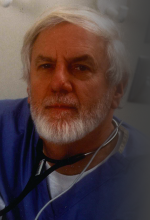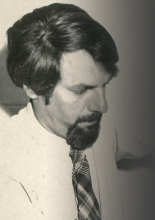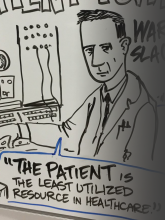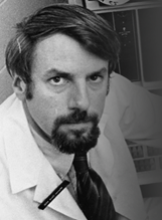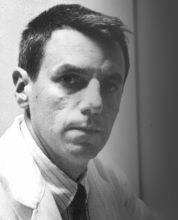About Warner
Warner Vincent Slack, M.D. was a Professor of Medicine at Harvard Medical School, a member of the Division of Clinical Informatics, Department of Medicine, and Department of Psychiatry at Beth Israel Deaconess Medical Center. For over 50 years, Dr. Slack has conducted pioneering research on the use of computers in the medical world. His goal was to empower both doctors and patients by improving the communication between them with patient-computer interviews, computer health care records, and computer search engines for medical journals.
Read this Harvard Medical School Memorial Minute.
He has been an outstanding educator to thousands of physicians, scientists, engineers, patients, families and the public.
Warner Slack was born in East Orange, New Jersey, in 1933. As a kid, Warner was very active and played basketball and football. He graduated from Mount Lebanon High School in 1951 and continued his education at Princeton University, where he played junior varsity football. In 1955, he graduated from Princeton and went to Columbia College of Physicians and Surgeons in New York City for his medical degree, earning it in 1959.
In the 60s, Warner was drafted into the Air Force and served with a M.A.S.H. unit at Clark Air Force Base in the Philippines. Following his Air Force service, Warner went to the University of Wisconsin in Madison in the Departments of Medicine and Computer Science. It was here that, with other members of the Department of Medicine, he developed the first computer-based medical history system in which the computer could engage in an interactive dialog with a patient. The computer program created so much interest that it was the subject of a documentary on National Educational Television, the forerunner of PBS. The computer communicated via questions, explanations, requests, and comments. Warner eventually discovered that the computer interview elicited more information than a traditional questionnaire and interviewing methods. His findings were published in 1966 in a paper called “A computer-based medical history system” in the New England Journal of Medicine. This paper latter became a seminal paper laying the foundation for future medical information systems.
It was at the University of Wisconsin that Dr. Slack also began his humanitarian work. In 1966 he was the co-founder of the Faculty and Students for Equality at the university. He was also one of the first members of the Society of Physicians for Social Responsibility, and a member of Physicians for Human Rights. He served on the Medical Advisory Board for the Juvenile Diabetes Foundation. He has also served on the Board of Trustees for Lasell College.
In 1970, Dr. Slack was lured away from the University of Wisconsin to come to Harvard and Beth Israel to work with Dr. Howard Bleich. The two of them created the “Laboratory for Computer Medicine,” and started working independently on their own projects, Warner on what he called “patient–computer dialog” and Howard on “expert systems and consultations with the computer systems.” The two Harvard professors have created, among other things, one of the world’s first integrated hospital computing system that is to this day a model for many other institutions. However, Warner and Howard eventually wanted to grow their laboratory into its own department. Both of them knew that if they asked permission from Beth Israel to form a new department, Beth Israel would either say no or form a committee which would still be standing to this day. So, without permission, they put a sign outside of their offices declaring themselves the Center for Clinical Computing. And they got away with it.
The Center for Clinical Computing went on to computerize every department of Beth Israel and Brigham and Women's Hospitals. The system serves the needs of physicians, nurses, house staff, other hospital personnel as well as patients themselves. It has gone through many name changes, and is now called the Division for Clinical Informatics.
By 1980, Drs. Bleich and Slack collected 10,000 different papers from various medical journals. They started putting these articles into a database and created a search engine to help doctors search through it. They called this program “Paperchase.” The academic article on Paperchase, published in 1983 in the New England Journal of Medicine, became a widely cited paper and role model for modern-day medical literature search systems. The program started off with one terminal in Dr. Bleich’s office in Beth Israel and later expanded with a grant from the National Library of Medicine. Within a year, Paperchase made Beth Israel became the largest searcher of the Medline database in the world, which eventually expanded to hospitals around the world.
At around the same time, Warner also created other computer programs, this time to help empower patients. He created a dietary counseling system that allowed users to input what they were eating and get advice from the computer. The results of which, he published in a series of four papers in the Journal of the Academy of Nutrition and Dietetics.
As Warner published more and more papers, he began to get involved in publishing process. From 1989 through 1998, he was Editor in Chief of the journal MD Computing. In total, he wrote more than forty-five different editorials and papers for MD Computing during his time as editor. In addition to MD Computing, he also served on the editorial board of Methods of Information in Medicine, Journal of Medical Systems, Computers in Psychiatry and Psychology, Computers in Human Behavior, Methods in Psychiatric Research, and International Journal of Methods in Psychiatric Research.
For being pioneers in the field of clinical informatics, Dr. Warner Slack and Dr. Howard Bleich received the Morris F. Collen Award for Excellence from the American College of Medical Informatics in 2001. This prestigious award is the highest honor in informatics that is presented by the American College of Medical Informatics to an individual or individuals whose personal commitment and dedication to biomedical informatics has made a lasting impression on healthcare and biomedicine. Drs. Slack and Bleich were recognized specifically for establishing the Center for Clinical Computing at Harvard Medical School and for their 30 years of collaborative research and pioneering contributions to the field of medical consultation, patient–computer dialogue, and hospital-wide clinical computing systems. William Stead, MD, said, “Summing up, their contributions are this clear focus on how to use a computer to do things that help real people, be they patients or be they physicians.”
In addition to receiving the Morris F. Collen Award, Warner has been recognized and honored by many different institutions. In 1995, Warner received the Outstanding Contributions to Society Award from his alma mater, Princeton University. In 2006, Harvard Medical School named a lecture for Harvard University’s CME Course, Patient-Centered Computing and eHealth. Finally in 2017, Beth Israel Deaconess Medical Center created the Warner Slack Fellowship to support graduate informatics fellows studying clinical informatics.
Dr. Warner Vincent Slack was an exceptionally generous and warm human being, who has educated and inspired thousands, and whose legacy will have a lasting impact for many decades to come.
